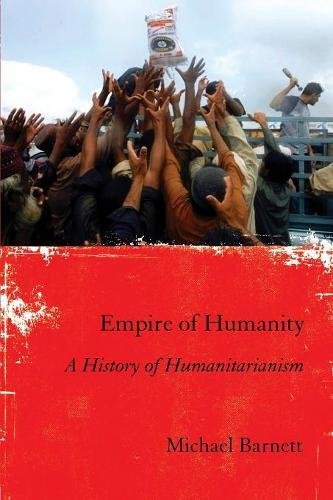Description
Empire of Humanity explores humanitarianism s remarkable growth from its humble origins in the early nineteenth century to its current prominence in global life. In contrast to most contemporary accounts of humanitarianism that concentrate on the last two decades, Michael Barnett ties the past to the present, connecting the antislavery and missionary movements of the nineteenth century to today s peacebuilding missions, the Cold War interventions in places like Biafra and Cambodia to post–Cold War humanitarian operations in regions such as the Great Lakes of Africa and the Balkans; and the creation of the International Committee of the Red Cross in 1863 to the emergence of the major international humanitarian organizations of the twentieth century. Based on extensive archival work, close encounters with many of today s leading international agencies, and interviews with dozens of aid workers in the field and at headquarters, Empire of Humanity provides a history that is both global and intimate.
Avoiding both romanticism and cynicism, Empire of Humanity explores humanitarianism s enduring themes, trends, and, most strikingly, ethical ambiguities. Humanitarianism hopes to change the world, but the world has left its mark on humanitarianism. Humanitarianism has undergone three distinct global ages―imperial, postcolonial, and liberal―each of which has shaped what humanitarianism can do and what it is. The world has produced not one humanitarianism, but instead varieties of humanitarianism. Furthermore, Barnett observes that the world of humanitarianism is divided between an emergency camp that wants to save lives and nothing else and an alchemist camp that wants to remove the causes of suffering. These camps offer different visions of what are the purpose and principles of humanitarianism, and, accordingly respond differently to the same global challenges and humanitarianism emergencies. Humanitarianism has developed a metropolis of global institutions of care, amounting to a global governance of humanity. This humanitarian governance, Barnett observes, is an empire of humanity: it exercises power over the very individuals it hopes to emancipate.
Although many use humanitarianism as a symbol of moral progress, Barnett provocatively argues that humanitarianism has undergone its most impressive gains after moments of radical inhumanity, when the "international community" believes that it must atone for its sins and reduce the breach between what we do and who we think we are. Humanitarianism is not only about the needs of its beneficiaries; it also is about the needs of the compassionate.
Customer FAQs:
Question: I want to order 100% authentic Empire of Humanity: A History of Hu… from your store. How I can place my order in Pakistan?
Answer: Our products are 100% imported and authenticated. To place order just either contact with us or place your order online. One of our sales person contact with you.
Question: Do you have physical store of Empire of Humanity: A History of Hu… in Pakistan?
Answer: No, you can only place order online because we import from USA as get order.
Question: How much more time you will take to deliver, once you get my order?
Answer: After order confirmation we do our best to deliver in 3 to 4 week.
Question: All prices are connfirm and accurate? How I can get exact Empire of Humanity: A History of Hu… price in Pakistan?
Answer: We do our best to list exact prices of all products but since dollar fluctuate in Pakistan so sometime we update at the time of order confirmation.
Question: Is there some discount I will get at the time of placing order?
Answer: For discount we usually send discount coupons. To get discount coupons of Empire of Humanity: A History of Hu… you can sign up our newsletter.
High Quality Goods
We are sourcing products from leading websites in the USA to ensure the highest quality for our end product.
Support
We have a team of professional sales representatives who will assist you in identifying the right products from Amazon.
Express Shipping
Upon receiving your order, we will expedite the shipping process by placing the order promptly and ensuring timely dispatch from the USA.
Secure Payments
Your payment will be securely held with us, and in the event that you receive an incorrect or damaged product, we will issue a refund.

